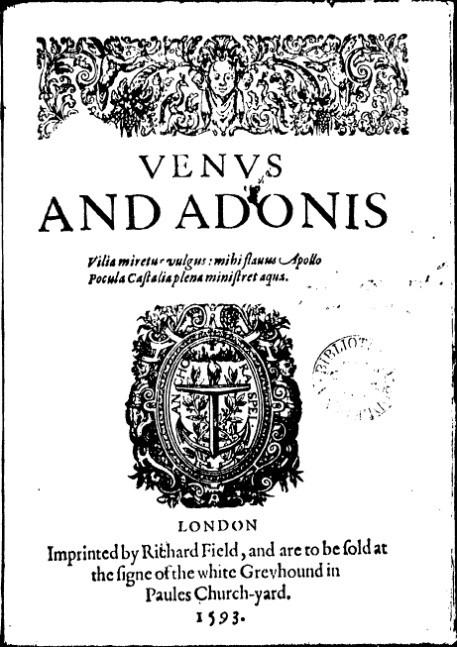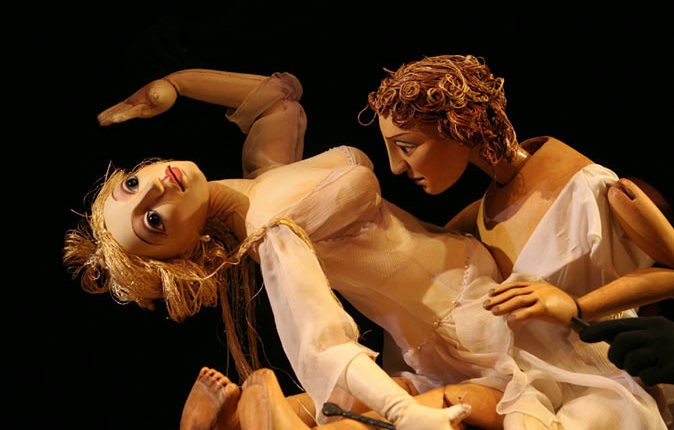2019-2020
The Shakespeare Society, October 4th 2019
Review by Julia Pirie
Venus and Adonis: The Shakespeare smash hit you never heard about

Sarah Olive is passionate about Shakespeare’s poem Venus and Adonis. For some years she has been sharing her passion with first year undergraduates at York University and this was obviously her brief when she came to talk to us. The poem - written in 1593 when the theatres were closed because of plague -was a ‘smash hit’ at the time; it was widely circulated and reprinted ten times in as many years. Assuming we had a greater familiarity with the poem than was actually the case (many admitted to having ‘read it’ in the past; two or three had mugged it up especially for the lecture) Sarah gave us an outline of how she presents it over an 8 week term to her students.
She charted her own engagement with the poem which she first saw performed as a puppet play directed by Greg Doran in conjunction with the Little Angel Theatre in 2004. She had found this a ‘magical experience’ which she tried to convey to us. However, with only the teeny pictures reproduced from her PowerPoint and her word for it, it was rather hard to understand how these three foot high, hand- operated puppets worked to dramatise the poem in such a powerful way.

The story itself is from Ovid’s Metamorphosis which tells of Venus’s frustrated attempts to seduce the young Adonis who would rather be mounted on his horse and who is ultimately gored to death by his quarry – the boar – before being transformed into a flower. In Shakespeare’s hands, to my mind, it becomes a thread on which to hang some titillating 199 stanzas of bucolic/erotic verse. Sarah tried to demonstrate it was more than that.
Having caught her students’ imagination with discussion of the puppet play, she moves them through seminars looking at Shakespeare’s sources; exploration of the text itself; the ‘characterisation’ of the protagonists; the description of the natural world and the extended metaphor of the stallion (which obviously Adonis is not) and the mare he rushes after; the critical vocabulary they will need to write on the poem (it’s set for coursework); the characterisation of Venus and various literary critical theories with which one might unpack it – including historical, feminist and Marxist. Her final sessions look at the poem in performance for which she references the 1978 radio play starring Diana Rigg and the South African version by the Isango Ensemble.
Quite a lively question time and discussion followed in which the consensus was perhaps that we should all go away to re-read the poem! Questions ranged from querying her ideas of the poem’s economic message (horse and bulb-trading in the Elizabethan age) to the ‘reasons’ why Shakespeare might have penned this piece and dedicated it to the Earl of Southampton (thought by many to be the ‘fair youth’ of the sonnets). The ‘cougar’ Venus in all her sweaty physicality is hardly the Kylie Minogue of the gay community but her depiction could be a role through which to examine the current issue of ‘fat-shaming’.
All that sex. How does that fit with the university demands for ‘safe space’ these days? I thought that Sarah’s response to the latter formed the beginnings of a good defence for those of us who have taught/teach in the Arts. Among other things, Venus and Adonis (certainly not popular in the 18th and 19th centuries) could now offer a ‘platform’ for discussion of inappropriate behaviour.
It is my view that students have always been challenged by texts. That’s what Art is there to do. My 14 year old grandson is ‘doing’ Macbeth and An Inspector Calls for GCSE. To Kill a Mockingbird has been on the curriculum for ever! Teachers offer these texts (as I guess art and music teachers offer theirs) not to frighten or shock students (Sarah seemed very aware of how immature and vulnerable her first year undergraduates were) but perhaps to give them the ultimate ‘safe space’ to find out about ‘man’s inhumanity man’ – and, indeed, glass half full, to consider the species at its heroic best. Our discussions so far this season have thrown up several ‘strong’ women whose behaviour defies the perceived patriarchal ‘norms’ of the 16/17th centuries. However, as many of us felt with the gender swapping in the latest Shrew and Maria’s behaviour in Fletcher’s Tamer Tamed, no kind of abuse is ever acceptable whoever the perpetrator.
A final thought (mine).How could the pen that had penned this Beryl Cook-esque Venus (I am plump) go on to create the dramatic poetry that is Cleopatra? In 1603 audiences met Goneril and Regan – two more ‘strong’ women. In our next two meetings, we shall be reacquainting ourselves with those two ‘unnatural cubs’ and the object of their affection (lust), Edmund, who is certainly no Adonis, and maybe we shall find out.